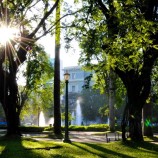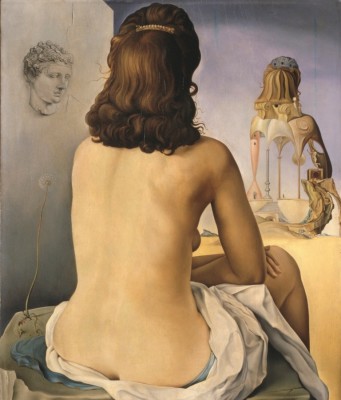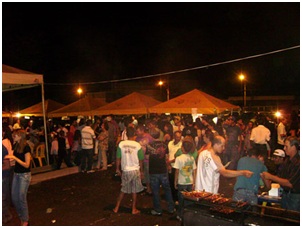Henry Ford (1863-1947), creator of the automobile industry’s assembly line, masterminded the mass market for cars. Initially his goal was to lower the price of cars to make them affordable for his workforce. The industry would then generate both employment and consumption for its products. The touchstone of capitalism is the accumulation of capital fueled by profit, and in order to increase profit, consumption must be increased so that wages increase and employees themselves become consumers of the increasing production.
The worst threat to capitalism has always been overproduction crises and under-consumption. It may seem like a paradox, but capitalists need workers to make their money circulate. Michal Kalecki (1899-1970), Polish economist living in the USA coined the phrase, “Workers spend everything they earn, capitalists earn everything they spend.”
Modern capitalism, whose output grows exponentially, created marketing and merchandising ploys which fuel the desire to buy, but beyond actual need and entices everyone, without any distinction of religion, caste, skin color, hair type or levels of education and knowledge, want to buy what the system offers to sell, advertises and makes desirable, as Karl Marx put it, by virtue of the commodity fetishism.
Today’s intense propaganda mercilessly reaches everyone, like a tsunami, a tremendously big wave so to speak. Capitalism entreats to indebt households and individuals, inducing the most unwary of us to eagerly seek out petty trinkets. Long term leases and instalment plans are juggling acts which eventually make payment parcels irresistible. The final figures loom up when thoroughly accounted for, but none of that enters the game at first. What matters is satisfying immediate desires that lead us to joyfulness. To get people out of low moods, depression, panic syndrome, all too common in today’s modern world, there’s nothing like the magic touch of a good shopping spree.
Shopping malls, global capitalism’s cathedrals of consumption, bring you beauty, comfort and secure parking at affordable prices, stimulating purchases amid the varied pleasures of movie theaters, food courts (with all the tastes and flavors imaginable), fitness centers displaying sculptural bodies along their corridors and princely decorated shops, all equipped with exciting and stimulating lighting effects. Devoid of all shadow they include every kind of attraction conceivable for our six senses. They even add a subtle perfume in the air conditioning, with scented bathrooms and nurseries. And last but not least, an array of human and electronic security systems.
The media thrives in today’s globalized, civilized and glamorous shopping malls, and tributes back by stimulating “faithful consumers” to visit on a regular basis, emphasizing their security and select public of attractive and well-dressed people. Many women visit the beauty salon before going to the shopping mall where they hope to meet up with Barbie Girl and Playboy Ken.
Shopping malls have become main entertainment centers across the globe, especially in capitals and big city areas where real estate speculation tied together with political vice are uprooting common open recreational grounds at an alarming rate. Remember all our old boyhood soccer fields here in Brazil?
It is these modern basilicas of global consumption where adolescents of middle-class families arrange to meet up with a dozen or so friends at least once every other day. These “hang outs” happen without much fuss and are a pure a simple delight for kids these days. Generally they go out, grab a bite to eat, and then go see a movie after being lured in by the flashy posters. A middle class mother once told me that the only safe place she felt she could leave her teenage daughter with her friends is at the shopping mall.
A friend of mine once said, “The mall tries its hardest to disqualify the streets. Brazil is exemplary in this process, since we are bombarded every day by the news channels whose main goal seems to be to remind us how the streets are dangerous, lethal places. To me this is a commitment to society’s “safety bubbles” and it is in this spirit that we stay in our cars, shopping malls, gated communities and so forth. This is also one of barriers to a truly public transportation.”
In the end, hangouts are seen as a “street-ization” of shopping malls, the popping of a security bubble and therefore entitled to all the dangerous paranoia that the STREET has come to represent after years of disqualification as a place for people. The city just isn’t a common place for civilized human beings anymore. It’s a concrete jungle, where the left-outs of consumerism’s savagery subconsciously take revenge on the savagery of the social apartheid to which they are subjected.
Then comes the issue of security. This industry of fear coming from the media also has a commitment to the security industry… It’s even been said that this subject is the only one strong enough today to make us look back at our city planning, from the metropolis to a federal level, integrating public entities from all walks of government since, due to cultural reasons, we do not think of the nation, the territory as one, and of our common responsibilities except in a subdivided and stanch way; i.e., that piece over there is yours and this here is mine, that’s yours and this is mine!
Being projects designed to generate and intensify profit, these shopping centers have become the center of an unexpected and even outlandish controversy: the so-called hangouts. Youths from the periphery areas around the big capital are also affected by the big wave, a tsunami of unscrupulous marketing that does not respect any boundaries, territories, social or economic strata.
Every teenager dreams of the most stylish pair of shoes, backpack, designer clothing, ripped jeans (as fashion dictates), mobile phones, tablet, iPhone, iPad, stereo, camera, cologne/perfume and fast foods that are sold far above their real value by brand name ostentation and their fence of monopolies. No matter next month, the parceled payments, chump change; they fit in everyone’s wallets and purses, especially the new middle class, newcomers to consumerism hangouts.
In the food courts, Coca Cola reigns supreme. It is in 100% of all cafes and restaurants in Brazil. Where is C.A.D.E., President Dilma? In all of Belo Horizonte’s major malls there are only three store chains that sell tennis shoes and sports equipment, and they all have the same owner. The thing worked out so well for him that he moved the company from BH to Sao Paulo and still wants to extend his false competition ring throughout all of Brazil and has already announced that his plan is to reach across all of Latin America. Put some serious people in C.A.D.E., Mrs. President!
Attracted by the sensuous image of Giselle Bundchen and so many other mermaids, youths from around the periphery also want to see this world up close and have their chance buy one or two things on member credit cards. The other day I saw a simple guy from one of the outskirt neighborhoods accompanied by his wife and children in their best clothes, visiting a shopping mall in the southern zone of Belo Horizonte just to show off the majestic beauty of the shopping mall to a family whose relatives are all from the interior. Overwhelmed by the spectacle set before their eyes, they felt like they were on another planet.
The fantasy of consumption has taken hold of everyone. Capitalism has triumphed globally. Everyone wants what’s on the advertisements. Even small children refuse healthy food in exchange for what’s on the TV commercials. Just about everyone dreams of those special pair of shoes and in-style clothing, of the products and objects being offered in the display glass, however irrational it all may seem. One columnists and defender of the cornered classes, in a shout out against the hangouts confessed: “People have the right to consume in peace!” His subconscious mind admitted that people are not just there to fulfill material necessities, but emotional ones; they don’t need to buy, they need to consume.
Despite being a common occurrence for kids to gather on the outskirts, the fact that hundreds and even thousands of these youths gathered for a hangout in the shopping malls rose to the surface in early December, 2013 and had many chief politicians, with one eye on the financial backers and another on the polls, pulling their hair out by the root. One foot on the accelerator and the other on the brakes, no hairstyle could possibly endure!
It all started so seemingly by chance. At first, frightened security guards tried to skirmish the teenagers who were gathering in an enthusiastic way in the mall parking lot. The alarm caused by the bodyguards themselves led the “misguided” teens to penetrate the inner areas of the mall and the matter ended up on the managers’ desks and then to the trade associations who then brought it to town hall and to the governor himself. Following this, a female minister opined on the matter and even The President of the Republic had an audience requested in her schedule to address the matter.
The frightened media, one eye on the advertisers and the other on their audience, took the term hangouts which was already widely used to say “go out” or “stroll around” and broadcasted it to the entire country and even abroad.
The hang-outs intensified, encouraged even further by the attention they achieved. The little famous ones felt proud of themselves, and more people were lining up who wanted to become a little famous person as well, as the conveners of these mobilizations self-label themselves, similar to what happened to the leaders of the Free Pass Movement which triggered demonstrations in June of 2013 and thereafter become celebrities, their eyes set on a councilor position, or even a possible deputy mandate as Odorico Paraguassu, lead character of global soap opera, O Bem Amado, said in an interview. The term caught on to members of the recent student movements in Chile where three of the leaders became highly voted deputies. In the hangouts in Belo Horizonte for example, there are already more than one hundred thousand followers on online social networks.
The word “hang-out,” rolezinho in Portuguese, is already part of online Portuguese dictionaries and will soon be in print volumes. Its definition: “Modality of instantaneous public demonstration – invented by teenagers from outlying underprivileged neighborhoods, members of the poor population of major Brazilian capitals and usually convened via online social networks which gather dozens or hundreds of participants in shopping malls to socialize, draw attention to, fool around and have fun.”
Hang-outs have anticipated and go well together with the summer season, taking the media and the authorities’ place set aside for the June protests by the black blocs which scalded the winter season.
I read this: “Here’s the contradiction: the youthful revelry, stirring up the weekends of teenagers from the outskirts is a horror movie in the imagination of those who are tasked to ensure order…”
On the other hand, naive leftists dream that this is more pressure coming down from the dominated classes who seek social inclusion by all means. I certainly hope so!
It is apparent that such imaginary provocation is leading truculent security guards to raise their nightsticks, but only down on poor peoples’ heads who wear baseball hats, tattoos or piercings, and especially when their skin is Afro.
I also read: “On one hand you have kids who have barely turned eighteen, on the other, pigheaded military police officers or those guys in black suits, trained to be guard dogs for store owners’ interests, directing insults and aggressions to their undercapitalized neighbors from the outskirts and relatives even.”
The pharaonic temples of consumerism are experiencing days of ghostly apprehension. Sheer panic, like at the Leblon Shopping Mall in Rio de Janeiro when they closed their doors for the entire day on Sunday, January 19th in order to avoid a gathering of over 8,000 youths as preannounced on social networks.
I also read: “Faced with a simple hang-out gathering, the monumental arrogance of the vaults of fetishism vanish like smoke in the wind. The impregnable towers of the superfluous, the caissons of reinforced concrete, steel beams, bulletproof glass, ultra guarded fortresses of luxury that accommodate the most expensive and cheesy brands assure total safety to their faithful consumers, but are defenseless against little boys and girls who, although they are not swimming in money, walk over with their heads held up high through the galleries that were made to sentence their exclusion.”
The charming and exquisite consumers feel constrained in the midst of people with cheap clothing, shoes, sunglasses and perfumes. Neither the right-wing paranoia nor the naive fantasy-minded lefties seem to see the reason. The commercial merchant’s panic, the security guards’ brutality, the political disorientation, how will this all be explained hereafter, once the dust settles?
The support of governors and politicians to repression is complacency with those who disregard the laws of this country and hire thugs to protect their silken hides and their faithful customers. What real legal grounds do they have for preventing the entry of a young woman from the outskirts? They say that the prohibition applies to underage kids who are unaccompanied by their parents, but when has a class A or B youth unaccompanied by their parents ever been prevented from entering a mall?
At least this matter has led us to a certain understanding: shopping malls as they are, enclosed, fortified, isolated, built to segregate, are the symbol of modern capitalism’s social apartheid. I wonder, do they feel entitled to the sovereign right to create extraterritorial laws?
And now is the time for the people of the periphery to create a social fact, its importance yet to be realized, but the open wound of today’s modern social apartheid is there for all to see. For some, individual transport in beautiful cars and limousines, to others, squeezed, hard, time consuming and slow going buses. For some, closed condos, for others, housing projects. For some, Private Health Plans, for others, go try S.U.S (Health Unique System). For some, free high quality public universities, for others, low quality paid colleges. For some, duty free, for others, flea markets. For some, shopping malls, and for others… the STREET! Maybe it would be better to put hot cloths on to not expose all the evils that lie behind a system that boycotted the utopias of the 20th century. The promise of the wonders of consumerism is not for everyone? Is capitalism not synonymous with democracy?
And so I leave the question to one of the greatest masters of capitalism: “Henry Ford, what do you suggest for modern capitalism which created the big wave of marketing and merchandising and now feels cornered by the wavelets of hangouts?”
Related Articles













